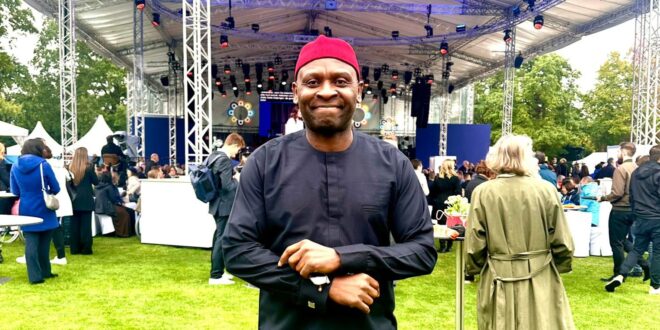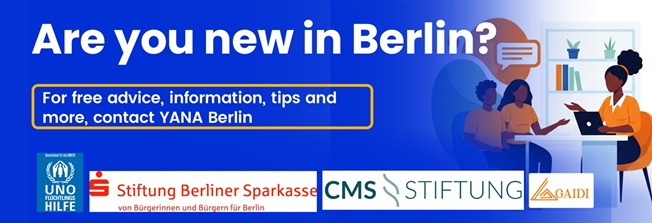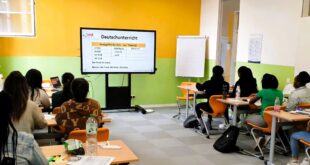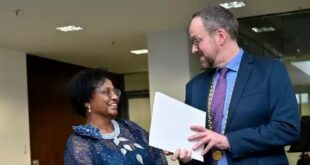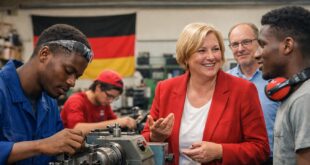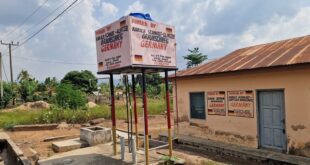A rare opportunity for Nigerians in Germany to speak directly with their diplomats took place in Frankfurt on 1 August 2025. The town hall meeting, part of the Consulate’s Consular and Migration Sensitisation Programme, addressed urgent community concerns — from passport delays to legal challenges and child welfare cases.
In this exclusive interview with The African Courier, Chuks Lewis Ehiwario, President of Concerned Nigerians Germany e.V. and keynote speaker at the meeting, reflects on the event’s significance, the challenges confronting Nigerians, the responsibilities of individuals, and how associations can better advance community interests.
![]()
What is your verdict on the event?
It was a huge success. This was not just another meeting — it was a turning point. It gave Nigerians a platform to be heard, to learn and to connect. The interactive format enabled us to tackle real issues directly, and the atmosphere was one of genuine dialogue and collaboration.
You gave a keynote entitled “Legal Obligations and Practical Ways to Navigate Legal Matters in Germany”. What was your core message?
I wanted Nigerians to understand that knowing your rights is not enough — you must also fulfil your responsibilities. Many get into legal trouble simply because they are unaware of how the system works or where to seek help.
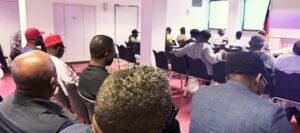
![]()
I discussed common pitfalls and offered practical steps to avoid them. Money should never be a barrier to getting justice. In Germany, low-income earners can apply for legal aid to cover consultation and representation fees.
I also stressed the importance of choosing the right lawyer when pursuing a case as legal practice is specialised, and the Rechtsanwaltskammer (Bar Association) can refer you to an expert in the relevant field.
A major focus was parenting challenges, particularly cases where children are removed from their families. I urged calm, non-confrontational engagement with the authorities, working with culturally aware professionals, early education on rights and responsibilities and seeking proactive support.
How responsive is the Nigerian diplomatic mission to community needs?
The Consulate in Frankfurt, for example, has shown willingness to engage, but there’s room for improvement. They should gather accurate data on Nigerians for direct communication and consistently deliver on promises, such as issuing passports within four weeks. Accessibility and efficiency are key.
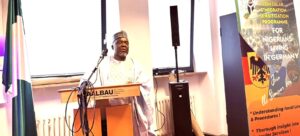
![]()
How can collaboration between the Mission and Nigerians be improved?
We need direct communication channels and regular engagement forums across German cities, not just Frankfurt. Collaboration must be inclusive, beyond ethnic or regional lines. Unity must move from rhetoric to action.
What are the most pressing issues for Nigerians in Germany?
The biggest challenge is disunity. Too often, we operate along ethnic lines, viewing one another as rivals rather than allies. This weakens our collective ability to advocate for our rights. Many associations focus more on socialising than on addressing serious issues like social justice, integration and legal rights.
Your recommendations?
We need to put Nigeria first. Community leaders must work for the people, not for political favours or personal gains. We should foster pan-community collaboration, create joint advocacy initiatives and support one another in legal, social and economic matters.
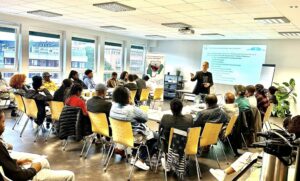
![]()
Tell us about Concerned Nigerians Germany.
We are a registered organisation committed to defending Nigerians’ interests in Germany. Our mission is to help our people integrate socially and economically while ensuring their rights are respected.
Our activities include:
- Advising immigrants
- Mediating with German authorities
- Providing voluntary interpretation and translation support
- Assisting with jobs and housing
- Accompanying people to official appointments and medical visits
- Guiding asylum-seekers through legal proceedings
- Organising cultural exchange events, seminars and social gatherings
In your view, what are the main challenges facing Nigerian associations in Germany?
Disunity and ethnic divisions, with too much focus on entertainment rather than empowerment.
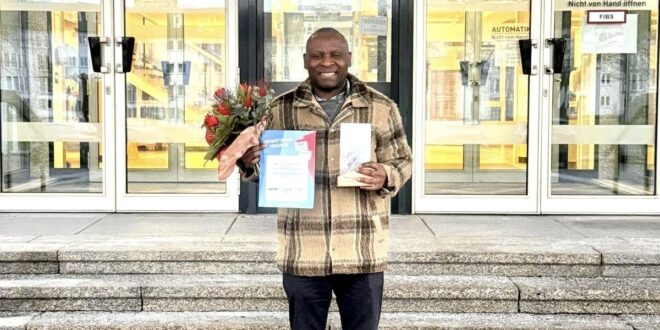
![]()
How do we overcome this?
We must put aside ethnic rivalries and prioritise building a strong, united Nigerian diaspora community. Only with one voice can we influence policy, protect our community and create real change. Our fight begins here in Germany. If we cannot stand together here, we cannot hope to bring meaningful change back home.
![]()
 THE AFRICAN COURIER. Reporting Africa and its Diaspora! The African Courier is an international magazine published in Germany to report on Africa and the Diaspora African experience. The first issue of the bimonthly magazine appeared on the newsstands on 15 February 1998. The African Courier is a communication forum for European-African political, economic and cultural exchanges, and a voice for Africa in Europe.
THE AFRICAN COURIER. Reporting Africa and its Diaspora! The African Courier is an international magazine published in Germany to report on Africa and the Diaspora African experience. The first issue of the bimonthly magazine appeared on the newsstands on 15 February 1998. The African Courier is a communication forum for European-African political, economic and cultural exchanges, and a voice for Africa in Europe.

